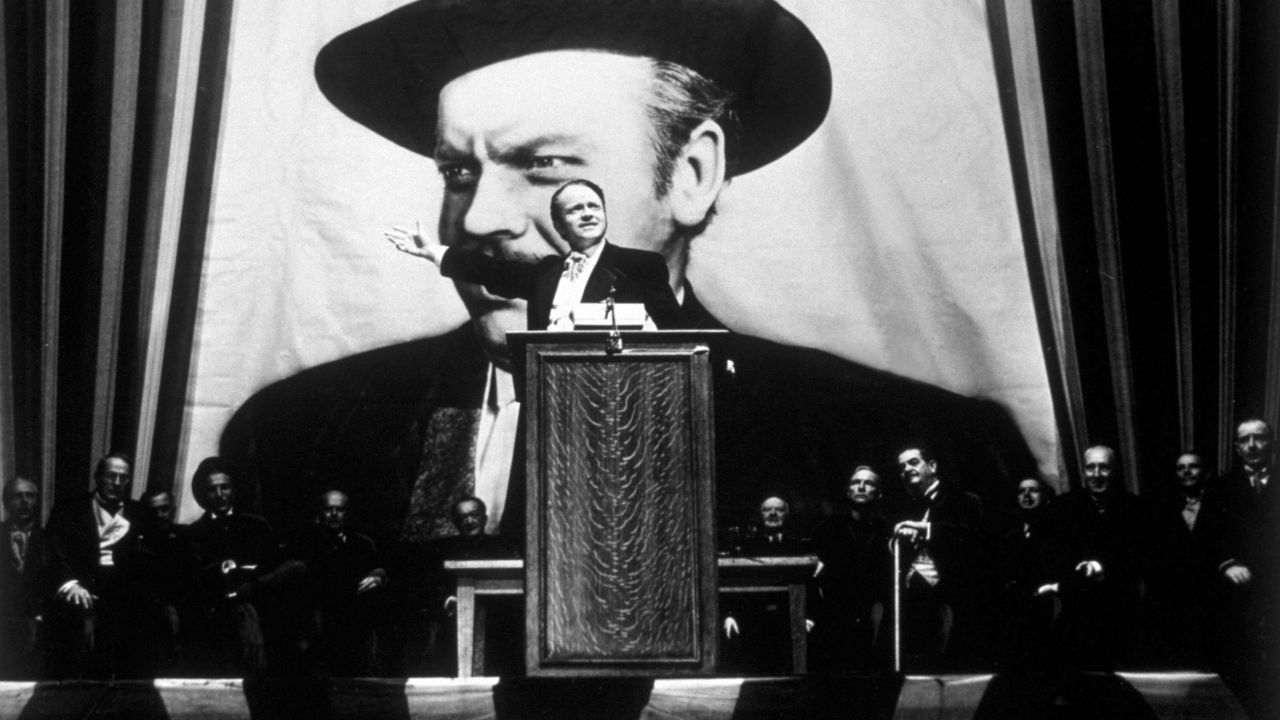
Orson Welles as demagogue Charles Foster Kane in Citizen Kane (RKO, 1941) (Photo by Hulton Archive/Getty Images)
With change afoot in Washington, we’ve put together a list of movies for you that deal with the subject of American demagoguery. For our purposes we haven’t included films about authoritarians overseas, such as Charlie Chaplin’s The Great Dictator or The Last King of Scotland, with Forest Whitaker’s remarkable performance as Uganda’s Idi Amin. No, for now we’re putting America first and keeping it close to home. And please add any additional suggestions in our comments section.
Gabriel Over the White House (1933)
We’re starting off with a somewhat eccentric rarity, although you can purchase it via Amazon and it does make an occasional appearance on Turner Classic Movies. Released the first year of FDR’s presidency, Gabriel Over the White House, directed by Gregory La Cava, is the story of President Judson Hammond (Walter Huston), an indifferent chief executive who ignores the horrors of the Great Depression until a near-fatal car crash transforms him into a born-again populist with dictatorial tendencies. He begins massive public works programs to give jobs to the unemployed, repeals Prohibition, fights racketeers with military tribunals and firing squads and warns other nations to pay off their war debts or face destruction. And when Congress fights his stimulus package, President Hammond declares martial law. See for yourself!
Citizen Kane (1941)
The greatest movie of them all, according to many critics and lists of the best. And it tells an amazing tale, directed by and starring Orson Welles (his first movie), chronicling the rise and fall of a media tycoon whose political aspirations are dashed by scandal. Herman Mankiewicz’s caustic and perceptive script was clearly based on the life of publisher William Randolph Hearst, and Hearst didn’t like it one bit. He did everything he could to keep the movie from being seen. But it’s a classic and when Kane declares, “People will think what I tell them to think!” you can hear the demagogic urge that seemingly motivates just about every one of his actions.
Here’s are Citizen Kane’s opening minutes, including a considerable chunk of the famous fictional newsreel created to set the stage for Kane’s story.
Keeper of the Flame (1943)
Only the second of Spencer Tracy and Katharine Hepburn’s nine-film collaboration, Keeper of the Flame aimed more for melodrama than comedy. Tracy plays reporter Stephen O’Malley, who plans to write a biography of recently deceased Robert Forrest, a man perceived by Americans — and O’Malley himself — as a great war hero. Although she has never cooperated with the press before, Forrest’s widow, Christine (Hepburn), agrees to help the reporter research and write his book. But as he falls in love with Christine, O’Malley becomes increasingly suspicious until Christine breaks down and tells him the truth, that her husband was a fascist, a demagogue-in-waiting aided and abetted by a cabal of plutocrats who planned to use his fame and reputation to take over the government.
The trailer:
All the King’s Men (1949)
Rush to see this version and not the 2006 Sean Penn remake. Robert Rossen wrote and directed this adaptation of Robert Penn Warren’s Pulitzer Prize-winning novel, the story of Willie Stark, a backwoods lawyer who becomes governor of his state and assumes dictatorial powers, all of which very much parallels the real-life biography of Louisiana Gov. and Sen. Huey Long. Stark begins as an idealistic populist, an unknowing stooge of the local machine. Soon he sees the light, but the unbridled power he ultimately attains brings nothing but corruption and tragedy.
Broderick Crawford’s performance as Stark is extraordinary and the rest of the cast is terrific, too. Here’s the campaign speech in which Willie first breaks free of the machine and discovers the strength of his angry, homespun rhetoric:
A Face in the Crowd (1957)
Another rags-to-riches story of power and corruption, written by Budd Schulberg and directed by Elia Kazan. Larry “Lonesome” Rhodes (Andy Griffith) is a drunken drifter with a gift for gab and guitar-picking who’s discovered in a jail cell by radio producer Marcia Jeffries (Patricia Neal). She builds him into a national media sensation and falls in love with her creation, a mistake that almost ruins her life. Rhodes’ demagogic ability to spellbind an audience comes to the attention of political and corporate insiders who enlist him to build up a lackluster presidential candidate. “I’m not just an entertainer,” Rhodes shouts. “I’m an influence, a wielder of opinion, a force… a force!” Hubris does him in, but A Face in the Crowd is prescient in its depiction of how mass media and charisma can manipulate public opinion.
Here’s the trailer:
Elmer Gantry (1960)
The great novelist Sinclair Lewis knew a thing or two about how easily America could succumb to authoritarian rule. The author of Main Street and It Can’t Happen Here also wrote Elmer Gantry, which 35 years later was turned into an Oscar-winning movie starring Burt Lancaster. Gantry is a two-bit salesman turned tent revivalist, preying on the gullible of small towns with a slick mix of hucksterism and evangelical Christianity. The demagoguery here is all about opportunism and making a fast buck, but Elmer’s talents would be scarily effective in the political arena. “I have here in my pocket — and thank heaven you can’t see them — lewd, dirty, obscene and I’m ashamed to say this: French postcards,” he tells a group of business leaders. “They were sold to me in front of your own innocent high school by a man with a black beard… a foreigner.” Where have we heard that before?
Here’s Elmer taking on Darwin and evolution:
The Manchurian Candidate (1962)
Here’s another where you should go straight to the original and skip the 2004 remake with Denzel Washington and Liev Schreiber. In the original, Laurence Harvey plays Raymond Shaw, decorated Korean War hero, son of mommy-from-hell Eleanor (Angela Lansbury) and stepson of Sen. Johnny Iselin (James Gregory), a demagogic Joe McCarthy sound-alike being groomed by Eleanor for greater things. But there’s something about Raymond — why do all the men who were with him that night in Korea have the same bizarre nightmares, and why do they sing his praises when in reality each of the soldiers hated him? John Frankenheimer directs a clever and, believe it or not, often very funny script by George Axelrod, based on the novel by Richard Condon. Frank Sinatra plays the troubled army major trying to get to the bottom of things; Janet Leigh is the woman who redeems him. This is the movie that asks the question, “Why don’t you pass the time by playing a little solitaire?” and wonders what would happen if a foreign government tried to control American politics. Preposterous!
Check out the trailer:
Seven Days in May (1964)
Another thriller from director John Frankenheimer, with a script by The Twilight Zone’s Rod Serling (based on a best-selling novel by Fletcher Knebel and Charles W. Bailey II). The president of the United States is signing an unpopular nuclear disarmament treaty and one of its leading opponents is Gen. James Mattoon Scott (Burt Lancaster), chairman of the Joint Chiefs of Staff. Unbeknownst to the president, Scott, a demagogue spoken of as a possible future president himself, is secretly plotting a military coup d’etat, backed by right-wing politicians and a leading media commentator. Gen. Scott’s adjutant, Col. Jiggs Casey (Kirk Douglas), starts to put the pieces together and goes to the White House, where he’s recruited to help unravel Scott’s scheme. Ultimately, Gen. Scott confronts Casey and asks “Are you sufficiently up on your Bible to know who Judas was?” Casey replies, “Yes, I know who Judas was. He was a man I worked for and admired until he disgraced the four stars on his uniform.” A powerful case for civilian control of the military.
In this scene, the president, played by Fredric March, faces down Lancaster’s Scott with evidence of his plot:
WUSA (1970)
Another rarity, this movie, directed by Stuart Rosenberg and written by the great Robert Stone (based on his novel A Hall of Mirrors), came and went from the theaters very quickly, but it foresaw the rise of right-wing talk radio, and Paul Newman allegedly thought it was one of the most significant films he ever made. Newman plays Rheinhardt — yet another drifter — who gets a job reading news and weather on reactionary radio station WUSA and soon finds himself caught up in the station’s radical right politics. Filmed on location in New Orleans, the story revolves around a plot by the radio station’s owner to get people kicked off welfare and the fraught tangle of relationships among Rheinhardt, his lover, Geraldine (played by Newman’s wife Joanne Woodward), and their neighbor Rainey (Anthony Perkins). Oh, and Laurence Harvey of The Manchurian Candidate is in it, too!
Here’s the trailer:
Network (1976)
Who can forget Howard Beale, “the mad prophet of the airwaves,” who tells his audiences to shout from the rooftops: “I’m as mad as hell, and I’m not going to take it anymore!” Anchorman Beale (Peter Finch) has had a major psychotic break and scheming TV executive Diana Christensen (Faye Dunaway) sees it as a way to build ratings for the faltering UBS television network. Beale becomes a demagogic media superstar until the top bosses fear he’s about to ruin a corporate takeover by a Saudi Arabian conglomerate. They rein him in, ratings collapse and the only solution is a drastic one. Directed by Sidney Lumet and written by the legendary Paddy Chayefsky, the screenplay whirls with smart, fast dialogue and skewers the TV industry, eerily forecasting an angry electorate, reality TV and so-called fake news. “You are television incarnate, Diana,” Christensen’s lover (and former UBS news director, played by William Holden) tells her, “indifferent to suffering, insensitive to joy. All of life is reduced to the common rubble of banality.”
Here is Beale’s electrifying “Mad as Hell” rant:
Bob Roberts (1992)
The title character, played by Tim Robbins (who also wrote and directed), is a right-wing millionaire running for the US Senate, singing and guitar picking like Andy Griffith’s Lonesome Rhodes but in a business suit and with song lyrics that are more Ayn Rand than Peter, Paul and Mary. Nonetheless, his pseudopopulist campaign catches fire and a faked assassination attempt only boosts his poll numbers as his incumbent opponent Sen. Brickley Paiste, played by Gore Vidal, is brought down by scandal. With alarming foresight, the late Roger Ebert wrote that for Bob Roberts, “populism no longer means the solidarity of the working class, it means its division — race against race, worker against worker, with hate being stirred up to obscure the real enemy, the profit-takers who are raping the companies and leaving them stripped and dead.”
Take a look at the trailer and you’ll see how correct Ebert was and how eerily close the fictional Roberts campaign is to our new president’s:
Good Night, and Good Luck. (2005)
This is the story of CBS newsman Edward R. Murrow’s epic confrontation with real-life right-wing demagogue Joe McCarthy, the senator from Wisconsin who did his best to cripple democracy with paranoia and red-baiting smear tactics. George Clooney directed, co-wrote with Grant Heslov and plays Murrow’s producer Fred Friendly. Murrow is played by David Strathairn, who gets to re-enact Murrow’s famous on-air indictment of McCarthy, a key factor in bringing him down: “The line between investigating and persecuting is a very fine one, and the junior senator from Wisconsin has stepped over it repeatedly. We must not confuse dissent with disloyalty. We must remember always, that accusation is not proof, and that conviction depends upon evidence and due process of law. We will not walk in fear, one of another. We will not be driven by fear into an age of unreason if we dig deep into our history and our doctrine, and remember that we are not descended from fearful men.”
The trailer:




